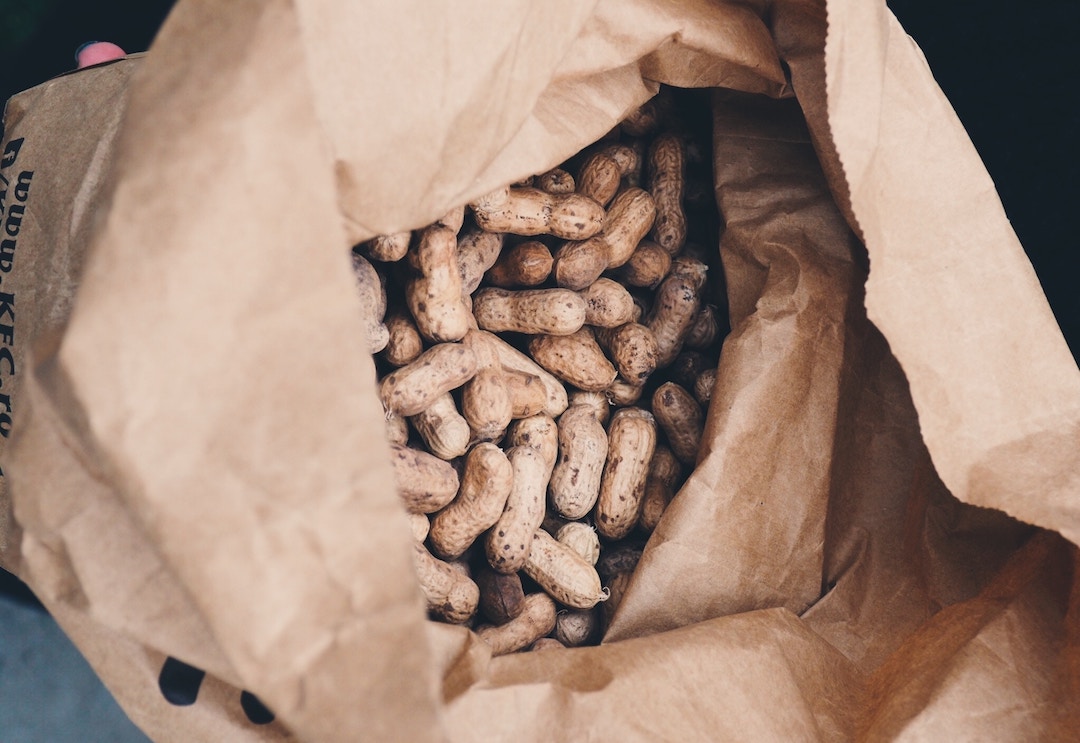Week 24 - What I Need to Know About Peanut Allergies

Peanut butter. A necessary ingredient in any protein shake, a founding member of PB&J, and a deadly weapon in most schools now.
In today's world of industrial chemical usage on produce, your average jar of peanut butter will contain around eight or so pesticides, including Piperonyl butoxide (a possible carcinogen).
In the last 20 years, the number of children with peanut allergies and the number of peanut-related allergic reactions has grown considerably. The question on people's' mind though, is why this constant growth?
This young generation, sometimes referred to as Generation Rx since many of them need to have an inhaler or EpiPen with them at all times, are growing up with both food and environmental-related allergies.
Unsurprisingly though, someone is able to make a lot of money because of this. Epipens alone increased sales by 76% in one year. And a one-time use Epipen ain't cheap. The president of the United States at the time, Barack Obama, even got involved. His daughter suffered from peanut allergies and asthma and worked to pass a bill that offered financial incentives to states that had schools with epinephrine on-hand. While this bill was praised by many, it was also criticized for not addressing the root of the issue.
Similar to my post about ocean pollution, treating the symptoms without addressing the cause doesn't help anyone in the end.
So, if there is so much issue with peanut butter causing these severe reactions, we need to look at how peanut butter, and peanuts in general, are processed and treated.
Fun fact: peanuts are not actually nuts. They're beans, or more intellectually sounding, they're legumes.
They grow underground, protected by a nice, soft, absorbent shell. Throw some GM seed in there, spray it with a nice cocktail of pesticides and synergists, and other tasty chemicals, and you got yourself a great way to mess with the human body.
Also, did you know that peanuts are often rotated with cotton? Crop rotation is actually good for plants and the soil, but not when you spray multiple rounds of glyphosate on the cotton crop. Doing so destroys any healthy microorganisms in the soil (since cotton is naturally resistant to glyphosate) and makes the peanut crop vulnerable to disease and other goodies. Throw some more insecticides and fungicides in there, and you're really just eating peanut flavored chemicals now. The fungicides are used because peanuts are generally grown in humid areas and are used to keep the levels of aflatoxin down - a poison released from fungi.
The best part? This all takes a toll on the body slowly, Meaning, there isn't much research on what's actually happening. Sure, we know it isn't great, but there hasn't been enough time to actually see what's happening to the human body after 15 or so years of eating this stuff. At least, not until recently.
But great, now we know that peanut butter is packed with chemicals, sugar, oil, and salt. What's next? Well, when it comes to anything we eat, you'll want to go organic. Sure, organic could still mean anything, but it will still probably be better than your normal 2-pack of Jif (even though it tastes so good).
Peanuts and peanut butter are good for you, just make sure you buy from good brands and farmers. Not only has it found to reduce your chance of type-2 diabetes, it's also packed with "fiber, vitamin E, potassium, folate, zinc and magnesium and contains resveratrol (also found in red wine), flavonoids, and antioxidants."
And as we learned earlier, peanuts are in the legume family, which includes soybeans. So if you have a peanut allergy, or think you do, get checked for soy too.
Turns out being rich might be bad for your health.
The American College of Allergy, Asthma & Immunology published a study showing higher rates of peanut allergies in families with higher incomes.
So what, money makes you allergic to peanuts?
Not quite. The issue is more what usually comes with money, like increased hygiene and protective parents. The theory behind this is children who are exposed less to harmful germs are actually hurting the development of their immune system. If you're using hand sanitizer every 5 minutes, your immune system isn't getting practice at fighting off disease and sickness.
This study found that the problem window is only up until age 9. After that, there isn't much of a connection between the allergy and household income. It looked at over eight thousand patients and found that almost 800 of them had elevated antibody levels for peanuts. It also found that the allergy was most common in racial minorities and males across all ages.
This peanut allergy affects over 400k school-aged children, and only 20% of them will outgrow this allergy. The other 80% will have to live life knowing that they could go in anaphylactic shock whenever they go into a restaurant or eat any processed food. These people will have to rely on their prescribed Epipen at that point. In cases where there is no Epipen available, make sure you call 911, remove them from the environment that exposed them, make them lie on their back, and maybe take some Benadryl if it's not an emergency.
An allergy is simply your body's reaction to an allergen. An allergen can range from dust to peanuts, and are normally harmless to most people.
These allergens though can cause some major reactions in some people's bodies, like peanuts causing anaphylactic shock. In this case, your body is identifying peanuts as an allergen, cells in your body called mast cells produce something called histamines, which basically cause inflammation and allow other bodily chemicals to come in and fix anything wrong.
When people actually display some sort of tangible reaction to an allergen though, it's usually because it's not the first time they've been exposed to it (it's actually the second time). Once your body is exposed, it prepares to fight it off again. This initial exposure will usually happen in the womb or through breast-feeding. But when they're exposed again later, that's when their body takes action against the allergen.
Exposure can also depend on the person. Meaning, someone could have a reaction by eating a peanut, or just by even smelling one (I actually grew up with someone who would go in anaphylactic shock as soon as she even smelled peanuts).
While peanut allergies are not common per se, they are the most common severe food allergy and the number of people allergic to peanuts is growing. In the UK at least, 2% of children will have a peanut allergy, and 0.5% of adults will also have the allergy. Of all the children who have the allergy, around 20% will outgrow it.
Also, if asthma, hay fever, or eczema runs in your family, you're more likely to develop a peanut allergy. Not exactly sure why, but see a doctor if that is something common in your fam.
So how do you know if you're having an allergic reaction or not, and if so, how severe is it?
Well, for those with a mild reaction, your most common symptoms will be:
-
Hives
-
Swelling
-
mouth/lip tingling
-
Tightness in the throat
If you're a little more sensitive though, you could experience any or all of the above, plus:
-
Difficulty breathing
-
A sense of impending doom
-
Increased heart rate, high blood pressure, red skin (like Asian glow)
These more serious symptoms mean that you are most likely experiencing anaphylactic shock. If so, get immediate medical help as it is potentially fatal if left untreated.
When it comes to getting tested, you'll obviously want to do it in a safe and controlled environment. A classic way is to do a skin prick test, where doctors just get a bunch of common allergic substances, slap it on your skin, give ya a little prick, and then wait to see what happens.
If that doesn't work, or you just want to know more, you can do a simple blood test and doctors look for the amount of IgE antibodies. Or, you could take that one step further and do the food challenge. Unfortunately for this, you probably don't get a shirt at the end (shout out Lucy's in New Orleans for giving me the Scorpion shot shirt). This food test just has you eat some foods that may or may not have been prepared in contaminated areas, and then you're just watched for a while to make sure nothing happens, or are recorded if something does happen.
When it comes to living with your nut allergy, it's as simple as avoiding nuts in everything you eat. Super easy and convenient!
But in all seriousness, when you don't make your own food, say you're going to a party or a restaurant, just make sure people know. Ask questions, tell them you're allergic and could literally die (while not being over-dramatic), and don't eat it if you're not sure. Since peanut allergies are so common, it should be pretty easy to figure out what is safe to eat or not in most cases. At least I assume it should be easy since it's so common.
Too Long; Didn't Read
Peanut allergies are pretty common today, affecting almost 20% of children and .5% of adults. Schools are peanut-free zones, and a PB&J could be a deadly weapon to those with more severe reactions.
When it comes to why people have peanut allergies in the first place, there seem to be two schools of thought:
-
We inject way too many chemicals into peanuts/peanut butter and it is destroying our body.
-
We sanitize too much and aren't training our immune systems enough to fight off sickness, disease, and regular allergens.
I personally think it's a combination of both, though I do lean more towards the chemicals argument influencing the constant rise in afflicted children (of which, only 20% will grow out of their allergy).
In cases where you or someone you know is experiencing a reaction to peanuts, the best thing you can do is (not necessarily in this order):
-
Remove them from that environment that triggered it
-
Give them an antihistamine or inhaler if on hand
-
Use an EpiPen if the reaction is severe
-
Call 911 for emergency medical assistance
Of course, you'll never want to be in this situation in the first place, so make sure you know what you're eating at all times. This is mostly going to be an issue when you're going out, so make sure to talk with the chef or host or whatever to figure out if you can eat the food or not. When in doubt, just don't eat it.
